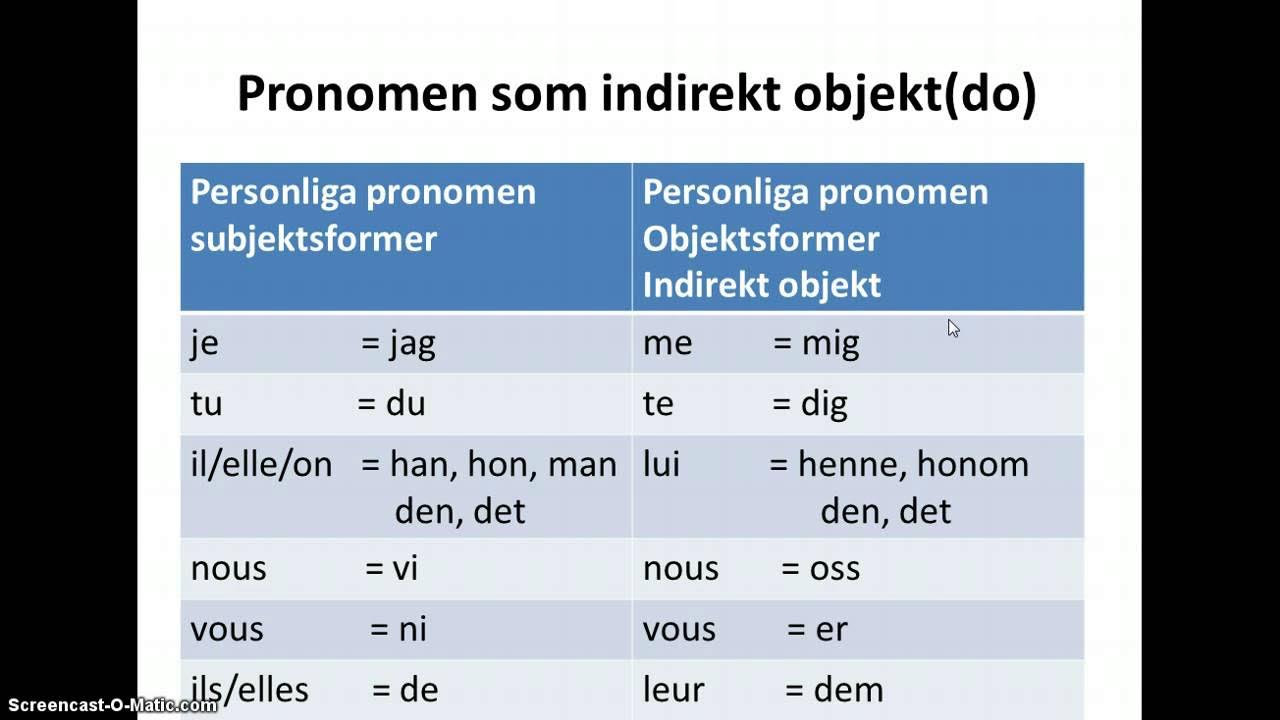Deutschkurs A1.2 Lektion 7 - Personalpronomen Dativ
Summary
TLDRThis video lesson explains the use of personal pronouns in the dative case in German, focusing on common verbs that require dative or accusative forms. It covers key verbs such as 'helfen' (to help), 'danken' (to thank), 'gehören' (to belong), and discusses prepositions that are followed by either accusative or dative cases. Examples are provided, helping viewers understand how to use personal pronouns correctly in different contexts. The lesson is designed to guide learners through these grammar rules with practical usage tips and example sentences.
Takeaways
- 😀 Personal pronouns in the dative case include: mir (I), dir (you), ihm (he), ihr (she), uns (we), euch (you plural), and ihnen (they).
- 😀 Personal pronouns in the accusative case include: mich (I), dich (you), ihn (he), sie (she), es (it), uns (we), euch (you plural), and sie (they).
- 😀 Verbs that require the dative case include: helfen (to help), danken (to thank), gefallen (to like), and gehören (to belong).
- 😀 Verbs that require the accusative case include: sehen (to see), hören (to hear), fragen (to ask), and anrufen (to call).
- 😀 Some verbs, such as 'anrufen', are separable and should be split when conjugated in a sentence (e.g., Ich rufe dich an – I call you).
- 😀 Dative verbs typically express actions done 'for' or 'to' someone, while accusative verbs usually describe direct actions like seeing or calling someone.
- 😀 Common prepositions that use the accusative case include: für (for), um (around), durch (through), gegen (against), and ohne (without).
- 😀 Common prepositions that use the dative case include: mit (with), nach (after, to), bei (at, by), zu (to), and von (from).
- 😀 An example sentence with the dative preposition: Ich spreche mit dir (I speak with you).
- 😀 To master German cases, it's essential to practice with real-life examples and sentence construction, as well as using both dative and accusative prepositions correctly.
Q & A
What is the main topic of the video?
-The main topic of the video is about personal pronouns in the dative case in German grammar, with a focus on usage in sentences.
What are some examples of personal pronouns in the dative case in German?
-Examples of personal pronouns in the dative case include 'mir' (me), 'dir' (you), 'ihm' (him), 'ihr' (her), 'uns' (us), and 'euch' (you all).
How do personal pronouns in the dative differ from those in the accusative?
-Personal pronouns in the accusative case represent the direct object in a sentence, whereas in the dative case, they represent the indirect object. For example, 'ich sehe dich' (I see you - accusative) vs. 'ich danke dir' (I thank you - dative).
Which verbs are commonly used with the dative case in German?
-Verbs that commonly use the dative case include 'helfen' (to help), 'danken' (to thank), 'gefallen' (to like), and 'gehören' (to belong).
Can you provide an example of a sentence using the verb 'danken' in the dative?
-An example sentence using 'danken' in the dative case is 'Wir danken dir' (We thank you).
What does the verb 'gehören' mean and how is it used in the dative case?
-'Gehören' means 'to belong to.' It is used with the dative case to indicate possession. For example, 'Das Handy gehört mir' (The phone belongs to me).
What is the role of prepositions in the usage of the dative and accusative cases?
-Certain prepositions always require the dative case, such as 'mit' (with), 'von' (from), 'bei' (at), and 'zu' (to). Others require the accusative case, such as 'für' (for), 'durch' (through), and 'gegen' (against).
What is the difference between the dative and accusative prepositions in terms of usage?
-Prepositions that take the accusative case typically indicate direction or movement, while prepositions that take the dative case usually indicate location or a state of being.
Can you give an example of a sentence using the preposition 'für' with the accusative?
-An example sentence with the preposition 'für' in the accusative case is 'Das Geschenk ist für dich' (The gift is for you).
What is the significance of understanding the dative and accusative cases in learning German?
-Understanding the dative and accusative cases is crucial for forming grammatically correct sentences in German, especially when using personal pronouns and prepositions. It helps learners communicate effectively and accurately in various contexts.
Outlines

هذا القسم متوفر فقط للمشتركين. يرجى الترقية للوصول إلى هذه الميزة.
قم بالترقية الآنMindmap

هذا القسم متوفر فقط للمشتركين. يرجى الترقية للوصول إلى هذه الميزة.
قم بالترقية الآنKeywords

هذا القسم متوفر فقط للمشتركين. يرجى الترقية للوصول إلى هذه الميزة.
قم بالترقية الآنHighlights

هذا القسم متوفر فقط للمشتركين. يرجى الترقية للوصول إلى هذه الميزة.
قم بالترقية الآنTranscripts

هذا القسم متوفر فقط للمشتركين. يرجى الترقية للوصول إلى هذه الميزة.
قم بالترقية الآنتصفح المزيد من مقاطع الفيديو ذات الصلة

GERMAN CASES- Accusative, Dative, Nominative - Learn German in Hindi

A2 - Lesson 34 | Wechselpräpositionen | Two way prepositions | German for beginners

Almanca A2 INTENSIV Ders - 14 Possessivartikel (Dativ) - Almanca Aitlik/Sahiplik İfadeleri

MIT vs. OHNE | Super Easy German 201

Learn German Intermediate | Reflexivverben | Reflexivpronomen | B1 - Lesson 1

Genomgång av indirekt objekt i franska
5.0 / 5 (0 votes)
